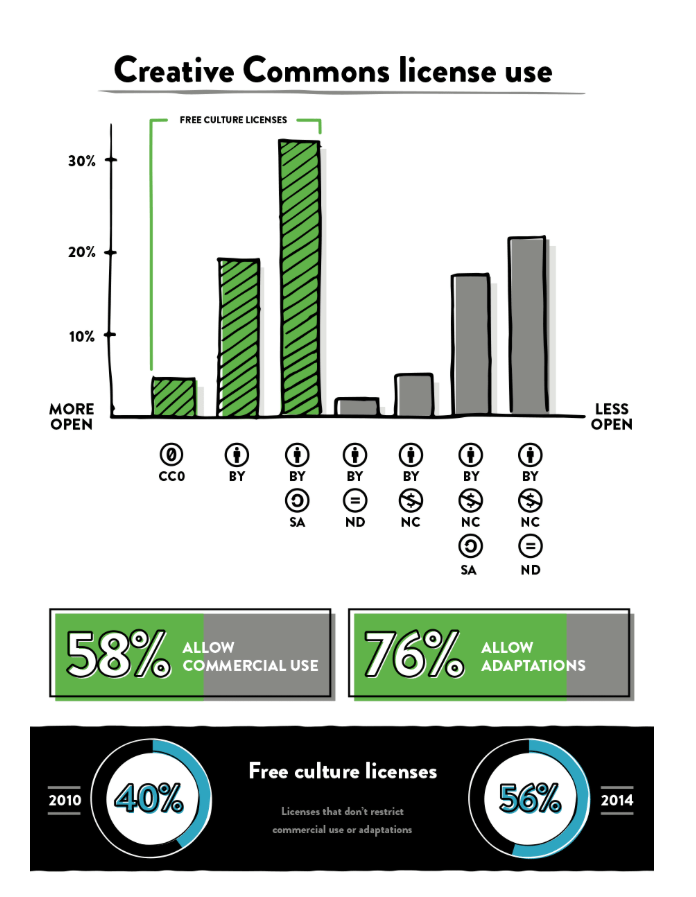Twelve years ago, Creative Commons made a big bet. We saw that the internet had transformed the ways in which people create, distribute, and consume content. And we believed that what it meant to be a creator was going to shift in a big way.
We built a set of licenses that creators could use to unlock their works, giving everyone permission to reuse, republish, and adapt them. The public responded, sharing millions of creative works under CC licenses — everything from photography to music to scholarly research and data.
Today, we’re releasing a report on the state of open content. The numbers show a rapidly growing culture of open sharing and permissive re-use.

Our data revealed nearly 900 million openly licensed works — including 300 million photos on Flickr, 34 million articles on Wikipedia, 10 million videos on YouTube, and many more — all under licenses that give the public permission to use and share them. Together, these numbers tell a story about what the new generation of creators on the internet looks like.
Distributing creative work used to be all about scarcity: the value of an album, book, or movie came from the fact that paying was the only way to get a copy. Creators used to ask themselves, “How do I protect my work?” Today, they’re asking, “How do I keep my work from getting lost in the noise?”
For many creators, open licenses are becoming a successful part of that strategy. Giving others permission to use your work can ultimately be far more beneficial than trying to lock it down.


All of this underscores the shift in the economics that power content creation, and the opportunity created by the growth of the web. We’re moving from a few exclusive creators and authors to a culture of creativity and knowledge sharing. That change is shifting business models, and fueling a debate about how and if it should all be monetized. The coming years will be very exciting, uncertain (and a bit painful) as old models bend or break under the weight of the culture of sharing, and new models emerge. But we should embrace that change, and keep our focus on the things that empower everyday creators, without getting too hung up on how megastars protect the existing business models.
Today, 9 million websites use CC licenses, and there are active, vibrant CC communities in over 75 countries. Those communities are building something even more impressive than 900 million CC-licensed works: they’re building a world in which we all have greater access to the world’s knowledge, information, and culture. Now that people have seen the benefits of open licensing in their own lives and work, they’re also beginning to demand it from their governments and public institutions.
This is an important area of work for CC. We believe publicly funded materials should always be shared under open licenses. When governments require open licenses on the materials they fund, they extend the life and reach of those materials many times over. All too often, the opposite is the case. When the public can’t access and use the resources it paid for, it’s not really getting its money’s worth.

Thanks in large part to a growing, worldwide network of advocates, 14 countries have made national commitments to open education. From Poland to Mauritius, governments are learning that the educational materials they fund will have more impact if they let everyone share and reuse them. Open textbook programs alone have saved students over 100 million dollars.
And this is just the beginning: we’re working on projects to equip and empower a new generation of advocates for open policy. And we’re setting our sights on copyright law itself, urging lawmakers to think carefully about how its decisions impact the public’s right to information, knowledge, and culture.
If you’ve ever uploaded a photograph, video, or blog post under a CC license, thanks. You’ve played a role in the story of how sharing is winning. (If you haven’t, try it! It’s fun.) If you believe that sharing content can make the world a better place — or that geography and economics shouldn’t limit people’s access to information, you’re on our team. We’re proud to fight alongside you.
There are lots of ways that you can get involved with Creative Commons’ work. Sign up for our newsletter. Join the Open Policy Network, a coalition devoted to fighting for sharing-friendly government policy. And finally, consider making a donation to support our work. We’re a tiny team, and like all nonprofits, there’s always more work to do.
Sometime in 2015, we’ll reach a billion openly-licensed works. What will you make with them?




